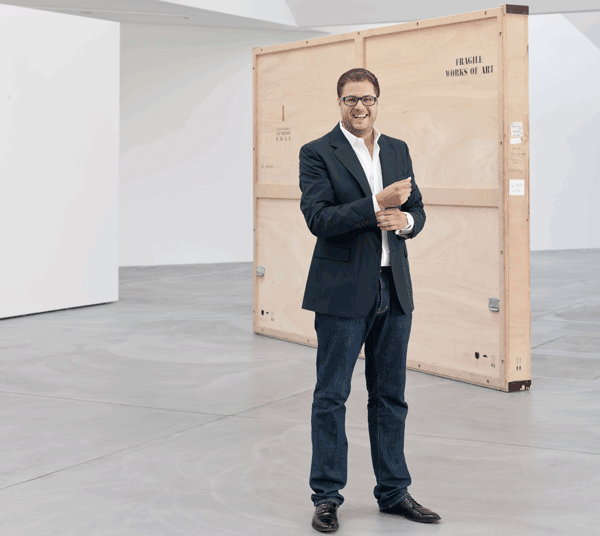Interview with Stefan von Bartha
In the Swiss city of Basel, there is a contemporary art gallery with a red petrol pump in front of it. The white letters above the wide glass doors spell “Von Bartha”, a name that stands for a 45-year family legacy in art collection and dealership. Upon walking into the garage-cum-gallery, we are greeted by second-generation owner, Stefan Von Bartha, the driving force behind the exhibition space. The 33-year old convinced his parents to take the risk and open the space in 2008. It was quite a change for the Von Barthas, whose main activities and exhibition space was, up-until-then, out of the family home in the city.
Tharawat magazine sat with Stefan and his father, Miklos von Bartha, on a long wooden table in the middle of their spacious, bright gallery, where we discussed why you can’t be an art dealer without being a collector, that passion cannot be taught, and what allows them to sleep well at night.
[ms-protect-content id=”4069, 4129″]
Did you always know that you wanted to join the family business?
Stefan: I grew up in a gallery. I mean we literally lived in the house in which my parents’ gallery was located. So for me, it felt quite natural to be in the art world. I always use to help my parents because it was way more entertaining to spend time with artists than to do homework. (laughs)
My parents accepted that both my brother and I had a strong passion for art. My brother actually also owns a contemporary art gallery in London. My interests initially revolved more around design. When I was 18, I started to deal in vintage design. In fact, I put together my first show at the time, which consisted of 420 vintage space toys. I sold 419 of them. My parents gave me 800 francs to set up the show. They invested in me and helped make it a success by giving me the gallery space and, I suspect, by telling people to be supportive. We even went on to create a vintage design label. By the age of 21, however, I realised that my real love was art and not design.
And there was the family business! At the time I tried working with my parents, but if you grow up in the art world and only have your parents as teachers, then you’ll surely have a problem when you start working for them. How will you earn respect in the family business? I decided to enrol in Christie’s education program for contemporary art in New York; and then I worked for Sotheby’s in Zurich and for a gallery in Berlin. I met other people who had a huge influence on how I saw the art world, and that gave me other, much needed perspectives.
I returned to Basel when I was 26. I clearly stated that I would only join the family company if I would be allowed to contribute my own ideas. I wanted to move the gallery into the next generation. At the time, we were transitioning towards a focus on contemporary art. I wanted the family business to become a professional setup for contemporary art. My parents thought I was crazy, but they got excited about the idea. We found this gallery around that time and decided to buy it. That was 7 years ago. I just recently found my first written proposal to my parents regarding the setup of the new gallery and had a good laugh – it didn’t exactly turn out the way I had planned at the time. It was good entertainment. The space is complex but was well worth it.
I think that over time you learn for both generations. As a member of the second generation, you are always quite focused on what you want to do. As you mature, you begin to also understand that for the first generation, it is not so easy to adjust.
Did you have a motive for continuously supporting your son’s passion for art?
Miklos: Yes, of course. I would never trust or buy from an art dealer who wasn’t also a collector. Passion matters. Some deal with this business as if it were no different from selling cars or washing machines. Art is different. Without personal commitment and passion it just doesn’t work.
Stefan: My parents have assembled a large collection, and my brother and I have done the same. My brother has a wonderful collection. I just got a new apartment and I hate the fact that I have too few walls to hang my paintings.
Miklos: This idea of just collecting one type of art is wrong. To be a collector means to have a sense of all beautiful things in the world. This doesn’t happen by sticking to one style. Keeping an eye on real beauty is what collecting is all about. It doesn’t have to be expensive.
Do you take more risks because you are a family owned business?
Miklos: We take more risks, and we carry the risk ourselves, of course.
Stefan: We take big risks with the artists we exhibit. Naturally, when two generations work together, there is a lot of friction. Because we are a family, the level of loyalty is extraordinary when work is tough. In a non-family firm, you might just leave – but not in a family business. There are conflicts, sure, but there is no questioning of the greater picture. It makes us stronger. This is a very important quality to have in an art world that has seen such dramatic transformation over the past 10 to 15 years. We also know of many family owned galleries where things didn’t work out because the second or third generations did not innovate, or the older generations refused change.
Miklos: In all the negative cases that I heard of, the younger generation knew nothing about art. It was not that they weren’t good people, they just had no vision.
Stefan: You have to have the right mixture. We have lots of discussions before making decisions in our family. We have a structure in the gallery. We have our meetings every two months.
Miklos: To run a gallery of this kind your most important consideration is your team. We treat everyone here as family. We have phenomenal people and that is our greatest asset.
Why this drive for constant innovation?
Miklos: In this business you don’t have a choice. You can’t stand still in such a fast pace industry.
Stefan: There is a now formula for galleries. You have to have an exhibition space and you must go to fairs. But ultimately, the money is made in art dealership.
Miklos: Innovation cannot be understood without understanding the past. You can’t be in the arts without historic knowledge.
Stefan: Today, people are buying more based on what they hear rather than what they see. Reputation is everything. We have a rule: At art fairs we speak only of the art. We only tell people about the price when they ask for it. Most people lead with price and then discuss the painting and the artist.
What values does Von Bartha stand for?
Stefan: We keep re-evaluating what we do. We keep questioning our strategy. The gallery has existed for 45 years and, in that time, has always managed to reinvent itself. I think that is one of our greatest qualities.
Miklos: We always pay everyone on time. The artists are treated with respect. We are a business and we need to take care of our reputation.
Stefan: I love to come to the gallery every day. I love my job. I like how this work makes us feel. I mean, I work a lot – actually, non-stop. In the little time I get to sleep, I like to sleep well and with a clear conscience. This is really important in the end.
Tharawat Magazine, Issue 25, 2015
[/ms-protect-content]

